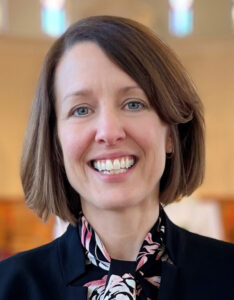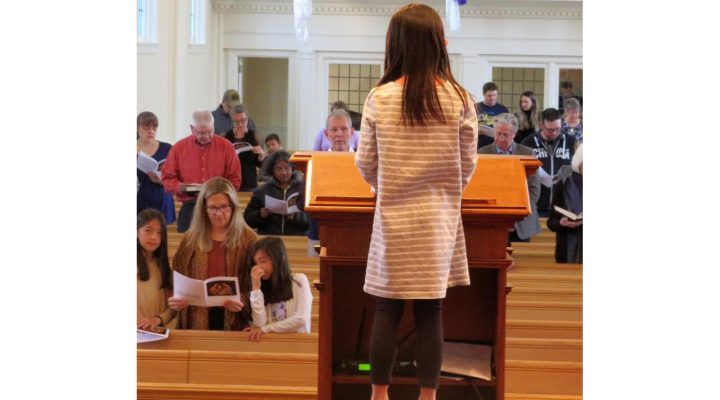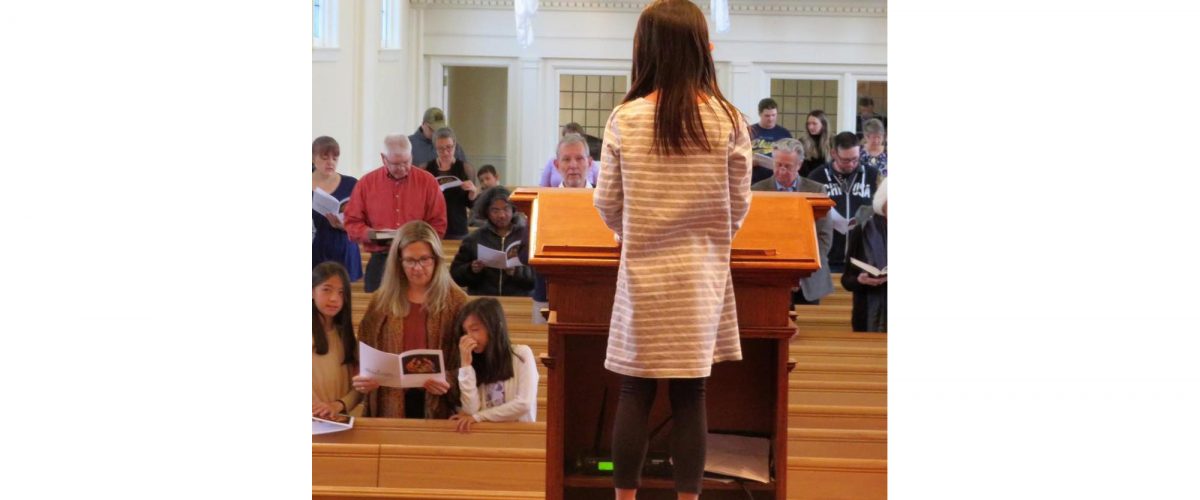Eleven years ago, when I became senior pastor of First Baptist Church in Columbia, Mo., my cousin wrote on my Facebook page, “You have shamed our family.”
I wasn’t really surprised by her reaction. After all, my extended family was deeply engaged in conservative Baptist life in Tennessee. My paternal grandfather, Bransford England, was a bivocational pastor in churches of that persuasion for 50 years.
Growing up in that religious environment meant I never witnessed a woman preach or even heard one pray aloud in worship. Instead, I heard sermons denouncing women in ministry. So, my cousin was expressing what her church and my extended family felt: as a woman, I didn’t belong in the pulpit.

Carol McEntyre
It is no wonder I went through a significant theological crisis when I felt God calling me to the ministry in college. Accepting God’s call took several years of theological reflection, the support of professors who taught religion at Carson-Newman University, the encouragement of my fiancé, Michael, and significant divine intervention.
When I decided to go to seminary, my parents were less than enthusiastic about my choice but were supportive, nonetheless. My mom helped me move across the country, and my parents assisted financially with my education.
My grandfather was intrigued by my decision to go to seminary, which surprised me. My husband, Michael, also enrolled at Truett Theological Seminary; perhaps my grandfather believed I was just along for the ride.
“My grandfather asked my husband to say grace at dinner, a task reserved for men and never extended to me.”
I noticed this disconnect the next Thanksgiving when my grandfather asked my husband to say grace at dinner, a task reserved for men and never extended to me. Still, he was curious about what we were studying and asked both of us questions regarding our courses. My grandfather had little opportunity for formal education but coveted learning and often would tell us he was proud of our pursuit of seminary training.
During seminary, when I made the decision to be ordained, I was nervous to tell my parents. I remember they both got on the phone as they often did when I called home. A long silence ensued when I told them about my upcoming ordination.
Then, my father spoke up and said, “We raised you to believe you could do anything, be anything.”
I responded, “Yes, but you were hoping I might be president, not a pastor.”
He laughed and said, “That’s more along the lines of what we envisioned. Still, we love and support you, even if it’s not what we believe.”
Even though my parents gave me tentative support, they asked me not to tell my grandfather or my extended family I was being ordained. They didn’t want to deal with the blowback, and frankly, neither did I. I knew my grandfather’s curiosity about my seminary training probably would not extend to support of my ordination, and I worried my extended family might be antagonistic.
“They asked me not to tell my grandfather or my extended family I was being ordained.”
A few years after my ordination, I was called to be the community minister at First Baptist Church in Knoxville, Tenn. My parents were thrilled to have me close to home again and began to visit us regularly in Knoxville.
To my surprise, they made sure to visit my church whenever I had the opportunity to preach. Over the next few years, they also signed up to participate in the mission trips I and others had planned for the church. After Hurricane Katrina, they did disaster relief in New Orleans, helped construct a Baptist Center in Croatia and assisted in building a house on the Texas border.
Over time, witnessing my ministry firsthand and being peripherally involved in First Baptist Knoxville, which supported women in ministry, their theology changed. The culmination of this was best reflected when my dad was nominated to serve as a deacon in his Southern Baptist church. He told the deacons during his examination process, “You need to know my daughter is a Baptist preacher, and I am proud of her.”
My father’s courage to openly acknowledge my calling in a church that didn’t support women in ministry was a testament to his transformation.
During my seven-year tenure at First Baptist Knoxville, my paternal grandparents never visited. However, my grandfather was interested in my ministry job. He always had been bivocational and wondered what full-time ministry entailed. He asked me, “What do you do all day?”
His question made me chuckle.
Yet, I never talked with my grandfather about my ordination or about my preaching occasionally. I could answer his question about my ministry honestly, without discussing those things — I did hospital visits, oversaw the church’s community ministries, led in worship, planned mission trips and cared for people who came to the church seeking help with basic needs. I never said, “But I really feel called to be a senior pastor and hope I will be someday.”
When I was called as pastor of First Baptist Church in Columbia, Mo., I no longer could hide my ordination from my extended family, nor did I want to. I was confident enough in myself as a minister and secure enough in my calling to just be me and not worry about what they thought or how awkward Thanksgiving dinner might be. As I mentioned, my cousin’s reaction to my new job was to post on Facebook that I had shamed our family and dishonored our grandfather.
Surprisingly, my grandfather didn’t seem to share my cousin’s sentiments. He wasn’t on Facebook, so he didn’t weigh in on my cousin’s post or, to my knowledge, know about it. But the next time I saw him, he inquired about the church: “What’s it like? How many people attend on Sundays? What’s the church’s history?”
“He shocked me by saying, ‘I know how hard pastoring is. I am going to pray for you every day.’”
Then, he shocked me by saying, “I know how hard pastoring is. I am going to pray for you every day.”
Over the next seven years, until he died in 2019, he repeated those words to me every time I saw him, and he added, “I wish the church were closer; I would like to slip into the back pew and hear you preach.”
I cherished his affirmation.
But he wasn’t willing to publicly support my call to ministry. Sometimes, I wonder what would have happened had my grandfather told my extended family he prayed for my pastorate daily or if he had asked me to say grace at a family gathering, which would have been a simple acknowledgment. Would his blessing have changed their minds? Maybe not, but I can dream, right?
Our families have a powerful influence and sway over our lives for good or ill. We all desire to have their unconditional love and support. For women called to ministry, sometimes we receive the blessing of our families (churches and denominations), and other times to follow God’s call we must forge our own paths.
I wish my entire family had wholeheartedly embraced and supported my call from the beginning. Their blessing was what I longed for and deserved.
“Their blessing was what I longed for and deserved.”
Still, I am grateful to my parents, in particular, for their ability to grow and change. Tragically, my dad died of COVID-19 in 2020, but his final words to me were an affirmation.
We couldn’t see him in his last days, but he texted me from the hospital. He wrote, “You remember when you were a little girl, I told you that you could grow up to be anything you wanted to be?”
I said, “I remember.”
He texted back, “You need to instill the same thing in Marin (my daughter). Teach her she isn’t limited just because she is a woman. She can be anything she wants to be. And you need to keep preaching the word.”
His final words were a full-circle moment. Ultimately, he blessed my calling and extended his affirmation to my daughter and whatever God might have in store for her.
Sadly, all my grandparents and my parents died in a short span of four years. As a result, I have spent a lot of time thinking about their legacy and what they passed on to me. They were deeply committed to Christ and the church, but I have grown to appreciate their willingness to grow spiritually. When the evidence of the fruits of my ministry were presented to them, they changed.
In honor of this, and them, I am donating $5,000 to Baptist Women in Ministry’s Multiply Campaign to ensure the vital work of advocating and nurturing women’s gifts continues. I plan to give the money in memory of my parents, Henry (H.L.) and Rita England, and my grandparents, Bransford and Helon England. This sum will be taken from the money I inherited from my family, a family that hasn’t always wholeheartedly embraced my call.
While their journey toward embracing my calling as a pastor took a while, they were curious enough to learn and open enough to be led by the Holy Spirit to a new understanding. In honor of their legacy, my gift to BWIM will allow them to be part of paving the way for other female ministers.
Carol McEntyre serves as senior pastor of First Baptist Church, Columbia, Mo., and former moderator of the Cooperative Baptist Fellowship. She is a graduate of Carson-Newman University, the Diana Garland School of Social Work and George W. Truett Theological Seminary at Baylor University and Drew Theological School.


